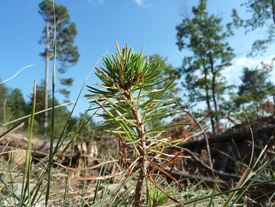
A recent collaborative work leaded by Raquel Benavides has studied the recruitment paterns of four dominant tree species (Pinus uncinata, Pinus nigra, Fagus sylvatica and Quercus ilex) in seven mountainous regions in the Iberian Peninsula, along entire elevational ranges.
The main goal of this research was to analyze for each species the effect of climate, local factors (i.e. light availability, stand structure and ground cover) and the interactions among them to identify the main drivers leading the regeneration process.
A recent collaborative work leaded by Raquel Benavides has studied the recruitment paterns of four dominant tree species (Pinus uncinata, Pinus nigra, Fagus sylvatica and Quercus ilex) in seven mountainous regions in the Iberian Peninsula, along entire elevational ranges.
The main goal of this research was to analyze for each species the effect of climate, local factors (i.e. light availability, stand structure and ground cover) and the interactions among them to identify the main drivers leading the regeneration process.
The study found high responsiveness to climatic variables (regional scale) on the four species, especially in terms of abundance and growth, with some of them influenced either by precipitation (P. nigra and F. sylvatica) or by both precipitation and temperature (Q. ilex and P. uncinata). The sensitiveness of species to climate differed between age classes, with seedlings being more sensitive than saplings. At the local scale, light availability (a direct consequence of the stand structure) exerted an overall positive effect on juvenile growth regardless of the age. Finally, variables at micro-habitat scale played also a relevant role for the distribution models, supporting the competitive ability of herbs and the facilitative role (with restriction) of shrubs reported in previous studies. At the same time, they modulated the effect of climate, exacerbating its negative effect on recruitment in heat-stressful places through competition or mitigating it through the nurse effect.
The results of this study stress the need of further research for better understand how the local heterogeneity can contribute to mitigate the effects of the ongoing global warming along environmental gradients, and to avoid the natural regeneration failure.
Reference:
Benavides R., Escudero A., Coll L., Ferrandis P., Ogaya R., Gouriveau F., Peñuelas J., Valladares F. 2016. Recruitment patterns of four tree species along elevation gradients in Mediterranean mountains: not only climate matters. Forest Ecology and Management 360: 287-296
The results of this study stress the need of further research for better understand how the local heterogeneity can contribute to mitigate the effects of the ongoing global warming along environmental gradients, and to avoid the natural regeneration failure.
Reference:
Benavides R., Escudero A., Coll L., Ferrandis P., Ogaya R., Gouriveau F., Peñuelas J., Valladares F. 2016. Recruitment patterns of four tree species along elevation gradients in Mediterranean mountains: not only climate matters. Forest Ecology and Management 360: 287-296

 RSS Feed
RSS Feed
